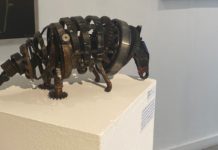It’s almost October. As summer falls toward winter, some of us of a certain age may feel a tension that is about more than bracing for the cold.
It’s hard to describe this haunting discomfort, but this ghost is old. If your parents or grandparents lived through The Great Depression, you know this as the time of year when both belts and emotions were tightened.
In the fall of 1929, the world went out from under many families, and the Depression permanently marked those who lived through it. We know of the men who lost fortunes and jumped to their deaths, and those who spent the next decades in poverty and fear. Our grandparents passed that fear down to our parents and on to us. Memory travels in us and through us with or without our knowledge, and with or without our consent.
Like most kids we rolled our eyes at those “never waste anything” stories. We imagined that we’d grow up to buy what we liked and throw away what we didn’t. But now our hand hesitates over the trash can.
We knew the sacrifices: My mother told us how she put cardboard innersoles in her shoes, and how her mother sat at the kitchen table every night rolling cigars for extra money. My father spoke less; his family had suffered more. My mother told us what he couldn’t. She always began, “Daddy’s family had no money during the Depression…” and some horror story followed of inedible things eaten or painful home remedies in lieu of medical care. I remember when my brothers were learning to fly-fish, embracing the catch-and-release philosophy, and my father would shake his head. When he was a kid fishing wasn’t an art, it was dinner.
Men of my father’s generation knew what economic depression could do to a person. My father’s fear never left him. We had a pantry of “emergency” food. He said it was “in case of a nuclear attack.” That was a 1950s’ image for sure, but starving was more real to him than the need for an air raid shelter.
Now it’s our turn. We are told that the jobless rate will improve. Whether that’s due to more jobs or more folks giving up, we’re not sure. Even as some declare that our economy is better, or that technology will save us, we sense the echo of our parents’ worry.
The scary truth is that the prospects of many Americans are dimming. As it becomes easier for some to make a killing, it’s getting harder for many to make a living. You might get a job but not a good one. The gap between rich and poor is wider than ever.
The current debate is whether capitalism will save us. Some complain that we’ve lost our Protestant work ethic. But I think we have forgotten what that phrase really means.
When social economist Max Weber coined that term, it was about more than working hard. The Protestant work ethic was a prescription for living a modest life, not a strategy for accumulating wealth. It included not just working at your job but also charity, thrift, compassion and a sense of what was enough. Sadly we’ve lost those parts. Now we’re left with something like, “Work hard and get yours” rather than the true Protestant work ethic: work, worship, give and live in community.
Perhaps that is why we’re shivering now as fall leans toward winter. These ghosts are not all from the past. There are more substantial specters knocking at our doors.
Diane Cameron is a Capital Region writer. DianeOCameron@gmail.com.
Credit: Source link































